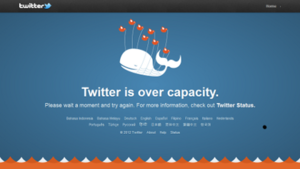
- Image via Wikipedia
It usually elicits a chuckle — calling media without comments, ratings, discussions, or polls “anti-social.” In 2010, the chuckles may be replaced by deep silences as audiences start to migrate to competitors with more normal — i.e., social — implementations for information resources.
And more creative ones.
Mitch Joel of TwistImage and author of “Six Pixels of Separation” denoted in a recent blog post how people could use Twitter in more creative ways than just creating a stream of links to their content. A few of his ideas:
- Create a “special offers” Twitter stream, and advertise it.
- Insert links to surveys in your Twitter stream.
- Create a “delays, emergencies” stream for your employees to follow in case of snow delays or traffic problems.
The utility of focused social media will become more evident in 2010, according to an interesting set of prognostications from ReadWriteWeb. And this on the heels of a year in which social media played a major role in the election of the President of the United States and in a social revolution in Iran that is still percolating.
In addition to more pressure to measure return-on-investment, Ravit Lichtenberg predicts that social media will become even more integrated into everyday activities, that social and mobile will meld, and that companies will integrate social media into their management practices.
A very important point in Lichtenberg’s post is that women will matter more in social media. I think this is very true — women are more social in general, and they are more socially accepted in roles of coordination and motivation, both of which are vital to successful social media.
One point neither makes is that social media is fairly inexpensive yet very useful if deployed creatively. This makes the ROI issue less about the technology than about the talent leveraged to use it.
All of which points to a year in which social media will become normal media, and information resources that don’t leverage it will be viewed more and more as anti-social.
Discussion
1 Thought on "Why Anti-Social Media Will Fail in the Coming Years"
![Reblog this post [with Zemanta]](http://img.zemanta.com/reblog_e.png?x-id=0b8f8db9-186e-4175-9263-dca2d0b158e5)


